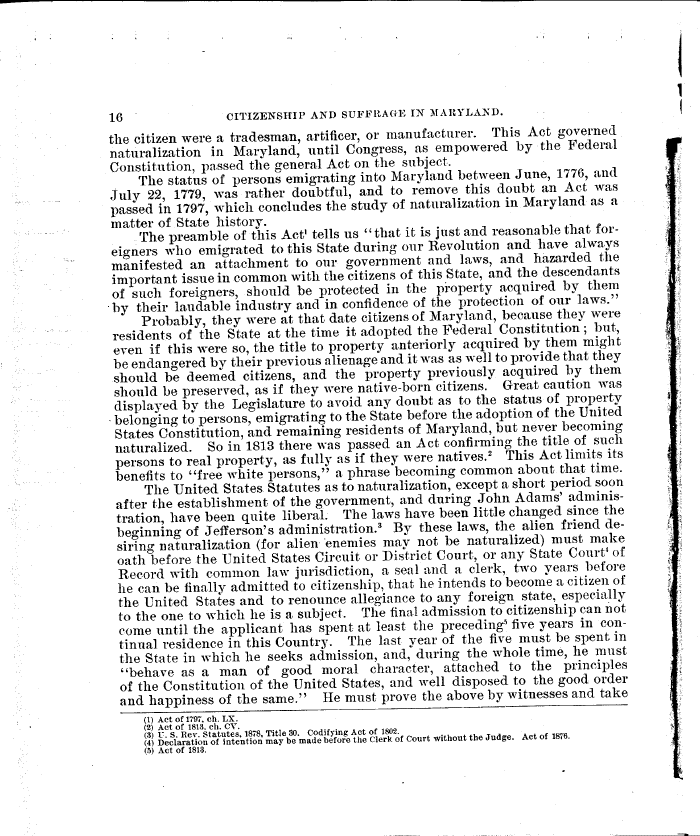|
1
16 CITIZENSHIP AND SUFFRAGE IN MARYLAND.
the citizen were a tradesman, artificer, or manufacturer. This Act governed
naturalization in Maryland, until Congress, as empowered by the Federal
Constitution, passed the general Act on the subject.
The status of persons emigrating into Maryland between June, 1776, and
July 22, 1779, was rather doubtful, and to remove this doubt an Act was
passed in 1797, which concludes the study of naturalization in Maryland as a
matter of State history.
The preamble of this Act' tells us "that it is just and reasonable that for-
eigners who emigrated to this State during our Revolution and have always'
manifested an attachment to our government and laws, and hazarded the
important issue in common with the citizens of this State, and the
descendants
of such foreigners, should be protected in the property acquired by them ''_
by their laudable industry and in confidence of the protection of our laws."
Probably, they were at that date citizens of Maryland, because they were
residents of the State at the time it adopted the Federal Constitution; but,
even if this were so, the title to property -,interiorly acquired by them
might
be endangered by their previous alienage and it was as well to provide that
they
should be deemed citizens, and the property previously acquired by them
should be preserved, as if they were native-born citizens. Great caution was
displayed by the Legislature to avoid any doubt as to the status of property
belonging to persons, emigrating to the State before the adoption of the
United
States Constitution, and remaining residents of Maryland, but never becoming
naturalized. So in 1813 there was passed an Act confirming the title of such
persons to real property, as fully as if they were natives.2 This Act
limits its
benefits to "free white persons," a phrase becoming common about that time.
The United States. Statutes as to naturalization, except a short period soon
after the establishment of the government, and during John Adams'
adlninis-'~
tration, have been quite liberal. The laws have been little changed since
the
beginning of Jefferson's administration.' By these laws, the alien friend
de-
siring naturalization (for alien enemies may not be naturalized) must make
oath before the United States Circuit or District Court, or any State
Court' of =~7 "
Record with common law jurisdiction, a seal and a clerk, two years before
he can be finally admitted to citizenship, that he intends to become a
citizen of
the United States and to renounce allegiance to any foreign state.
especially
to the one to which he is a. subject. The final admission to citizenship
can not
come until the applicant has spent at least the preceding-1 five years in
con- 's
tinual residence in this Country. The last year of the five must be spent in
the State in which he seeks admission, and, during the whole time, he must
"behave as a man of good moral character, attached to the principles
of the Constitution of the United States, and well disposed to the good
order
and happiness of the same." He must prove the above by witnesses and take
(1) Act of 1797, ch. LX.
(2) Act of 1813, ch. CV.
(3) 1 . S. Rev. Statutes, 1818, Title 30. Codifying Act of 1802.
(4) Declaration of intention may be made before the Clerk of Court without
the Judge. Act of 1876.
(5) Act of 1813.
r
|

